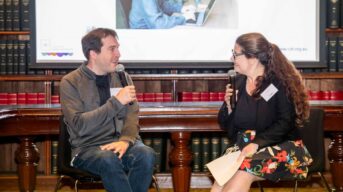
Accessible information and communications – Disability Royal Commission Final Report
The Disability Royal Commission calls for accessible information and communications.
CID Board Director Robert Strike AM told the Royal Commission – “Do Easy Read. I want for people to try and show in different ways by using pictures and words together. …. People like using big words. I don’t like big words.”
What the Commissioners said
People with disability have a right to access information and communications on an equal basis with others. Information and communications are accessible if people with disability can use and understand them in a way that suits their needs.
Accessible information and communications are a critical safeguard against violence, abuse, neglect and exploitation. They are necessary for people with disability to exercise autonomy.
People with disability often find information and communications inaccessible, in contexts including health care, disability service settings like group homes, education, employment and prisons.
What the Commissioners recommended
The Commissioners recommended that all Australian governments develop a national plan to improve accessibility of information and communications for people with disability
The Commissioners said that, at a minimum, the plan should include how and when to provide material by means of Easy Read, Easy English, Auslan, live and closed captioning, braille or audio description. The plan should provide ways for people with disability and specialist organisations to be involved in producing accessible information.
Where information is to be made accessible, it needs to include people with disability in the production process right from the beginning. The process will be richer and more accurate with their feedback and their capacity to drive what happens in a way that is going to be useful for them.
What CID says
CID welcomes the Royal Commission highlighting the importance of accessible communications and its recommendation to governments to act through a national plan.
CID has been championing the use of Easy Read for many years. We produce Easy Read versions of our information and advocacy resources.
Our Everyday for Everyone campaign has highlighted the barriers that people with intellectual disability face in using NSW government information. The government provides very limited information in Easy Read.
Government websites and apps are too complex to navigate and require devices that many people with intellectual disability do not have. Government agencies are providing less and less services face to face or by direct phone lines. Instead they expect people to use inaccessible digital technology. This means people with intellectual disability are robbed of their independence.
In the lead up to the 2023 NSW election we asked political parties to:
- Make all government documents relevant to the everyday lives of people with intellectual disability available in Easy Read. Make them easy to find on government websites.
- Develop its own Easy Read Style Guide. People with intellectual disability should be involved in making it.
- Make sure that people with intellectual disability can get government services in a way that works for them, whether that is an easy-to-use website, talking to someone on the phone, or seeing them face to face.
- Make a toll free phone line available for people who need spoken information.
The incoming Labor Government committed to work towards making all government documents that are relevant to people with intellectual disability in Easy Read by 2025. This includes developing an Easy Read style guide in partnership with people with intellectual disability.
We applaud this commitment which is a good first step towards accessible information for people with intellectual disability.



 1800 424 065
1800 424 065 













